TedX Edmonds College

Theme: Rethinking Resilience
Mission: Our goal is to redefine the concept of resilience by shifting the focus from individual achievement to collective action. We aim to inspire a paradigm shift in the understanding of resilience, emphasizing its true power when cultivated within a supportive community.
Through our innovative speaker series, we seek to explore the intersection of community non-profits, resilience, and diversity, equity, and inclusion. By showcasing non-profit organizations and community leaders dedicated to dismantling racial and other inequities, we strive to foster a collective consciousness that champions inclusivity and empowers communities to support each other in the face of adversity.
Join us in reshaping the conversation on resilience, as we work together to build a more equitable and resilient future for all. This event will be livestreamed.
Speakers
Ahmad Hilal Abid
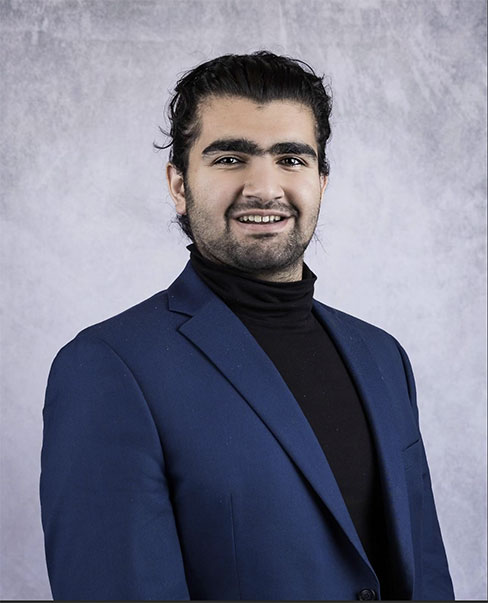 Coming to the United States at 17, I encountered difficulties stemming from my experiences
in Afghanistan. There, opportunities for education and growth were scarce because
of my family's connection to the United States Army. I couldn't even pursue my passion
for soccer due to family obligations. Life in the United States presented its own
set of hurdles: language barriers, social isolation, and a lack of community support.
But within just five years, I managed to overcome them. I started by taking English
as a Second Language classes at Edmonds College, and through hard work and dedication,
I mastered the language in just a year and a half.
Coming to the United States at 17, I encountered difficulties stemming from my experiences
in Afghanistan. There, opportunities for education and growth were scarce because
of my family's connection to the United States Army. I couldn't even pursue my passion
for soccer due to family obligations. Life in the United States presented its own
set of hurdles: language barriers, social isolation, and a lack of community support.
But within just five years, I managed to overcome them. I started by taking English
as a Second Language classes at Edmonds College, and through hard work and dedication,
I mastered the language in just a year and a half.
As an immigrant youth, I realized that there were few resources available for immigrant and refugee students, as I needed someone to assist me with my homework. I founded House of Wisdom, a nonprofit organization serving over 150 students in Edmonds College, Lake City, Everett, and Marysville. It provides math and English tutoring, assists immigrants and refugees with navigating the American education system, and creates cultural introduction and community engagement programs to bring communities together and fight against hate and racism.
Alonda Williams
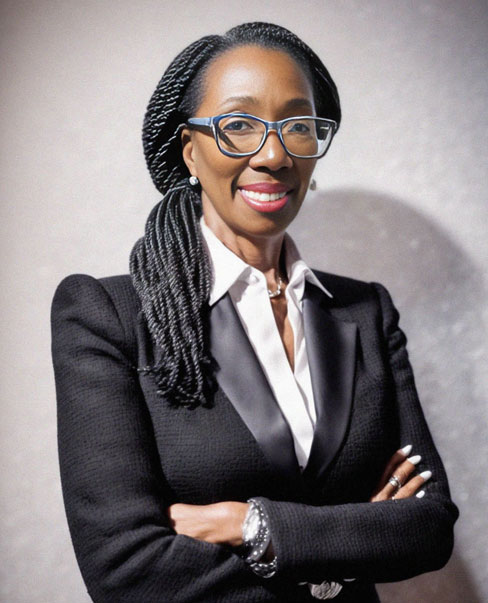 Alonda Williams is the President and CEO of Big Brothers Big Sisters of Puget Sound,
the largest mentoring organization in the state of Washington. She is responsible
for the strategic vision, advocacy, managing operations, program impact and community
relationships. Big Brothers Big Sisters of Puget Sound serves over 3000 youth, families
and mentors (Bigs) in the greater Seattle and Tacoma area.
Alonda Williams is the President and CEO of Big Brothers Big Sisters of Puget Sound,
the largest mentoring organization in the state of Washington. She is responsible
for the strategic vision, advocacy, managing operations, program impact and community
relationships. Big Brothers Big Sisters of Puget Sound serves over 3000 youth, families
and mentors (Bigs) in the greater Seattle and Tacoma area.
Alonda has over 20 years of leadership experience across technology, education, and the nonprofit industries. In addition to the Y, she has led teams for several companies including Microsoft, Verizon Wireless and Qualcomm as well as Bellevue College. While Alonda has deep subject matter expertise in Product Management, Mentoring, Marketing, Inclusive Communications, Fundraising and CRM, she is equally passionate about Justice, Equity, Diversity and Inclusion (JEDI) and people development.
In addition to her professional experience, Alonda has also served as an adjunct instructor at Rutgers University and Bellevue College where she taught Marketing, Human Resource Management and CRM. She has also taught several corporate leadership development programs through City University. Additionally, she is a TEDx organizer where she has brought together communities for three TEDx events.
Outside of work, Alonda is committed to empowering young people, with a particular focus on young girls. As an author and publisher, her children’s book series Penny and the Magic Puffballs, is designed to build healthy self-esteem in young girls. Alonda is an active board member of One Earth Rising and volunteers with several nonprofit organizations including Committee for Children, Jack and Jill of America and Delta Sigma Theta. Alonda is married to Byron and they have two adult children Paris and Tyler.
Blair Kaplan Venables
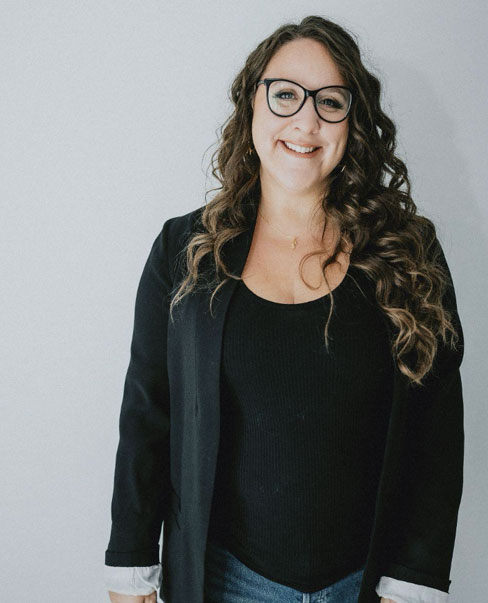 Blair Kaplan Venables is a British Columbia-based grief and resilience expert, motivational
speaker and the Founder of The Global Resilience Project. Her expertise has been featured
in media outlets, including Forbes, CBC Radio, Entrepreneur, and Thrive Global. She
is named the Top Grief and Resilience Expert of the Year 2024 by IAOTP. USA Today
listed Blair as one of the top 10 conscious female leaders to watch and she empowers
others to be resilient from stages around the world. 'MyStory,’ which is a television
show available on Amazon Prime Video, Apple TV+ and Google Play, showcases Blair's
life story. She is the host of the Radical Resilience podcast, a motivational speaker
and bestselling author. She specializes in helping people strengthen their resilience
muscle using scientifically proven methods and guides grieving high performers with
her Navigating Grief Framework. The Global Resilience Project’s award-winning books
are international bestsellers, and her fourth book, RESILIENT A.F.: Stories of Resilience
Vol 2, will be published in January 2025 . In her free time, you can find Blair writing,
travelling the world and helping people through their most challenging moments.
Blair Kaplan Venables is a British Columbia-based grief and resilience expert, motivational
speaker and the Founder of The Global Resilience Project. Her expertise has been featured
in media outlets, including Forbes, CBC Radio, Entrepreneur, and Thrive Global. She
is named the Top Grief and Resilience Expert of the Year 2024 by IAOTP. USA Today
listed Blair as one of the top 10 conscious female leaders to watch and she empowers
others to be resilient from stages around the world. 'MyStory,’ which is a television
show available on Amazon Prime Video, Apple TV+ and Google Play, showcases Blair's
life story. She is the host of the Radical Resilience podcast, a motivational speaker
and bestselling author. She specializes in helping people strengthen their resilience
muscle using scientifically proven methods and guides grieving high performers with
her Navigating Grief Framework. The Global Resilience Project’s award-winning books
are international bestsellers, and her fourth book, RESILIENT A.F.: Stories of Resilience
Vol 2, will be published in January 2025 . In her free time, you can find Blair writing,
travelling the world and helping people through their most challenging moments.
Cameron Kinley
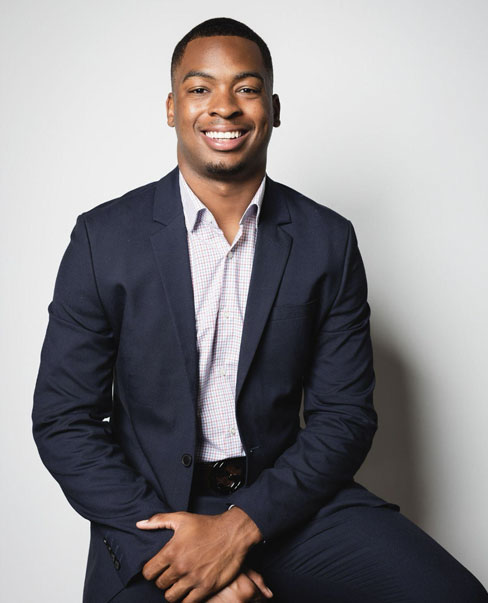 Cameron Kinley is a visionary, decorated athlete, and motivational speaker. Cameron
attended the United States Naval Academy, where he served as the president of his
class and the captain of the varsity football team. After graduating with a B.S. in
Political Science, Cameron had the opportunity to fulfill his childhood dream of playing
in the NFL. Initially denied a delayed commission, Cameron received Presidential permission
to sign as a free agent with the Tampa Bay Buccaneers. While Cameron was ultimately
released, he turned this adversity into victory to continue on his life’s mission
of service, fueling his passion for empowering others. Today, the Memphis native continues
to serve as an intelligence officer in the United States Navy and is an active mentor
throughout his community.
Cameron Kinley is a visionary, decorated athlete, and motivational speaker. Cameron
attended the United States Naval Academy, where he served as the president of his
class and the captain of the varsity football team. After graduating with a B.S. in
Political Science, Cameron had the opportunity to fulfill his childhood dream of playing
in the NFL. Initially denied a delayed commission, Cameron received Presidential permission
to sign as a free agent with the Tampa Bay Buccaneers. While Cameron was ultimately
released, he turned this adversity into victory to continue on his life’s mission
of service, fueling his passion for empowering others. Today, the Memphis native continues
to serve as an intelligence officer in the United States Navy and is an active mentor
throughout his community.
The focus of my Tedx Talk is the importance of the process of resilience rather than just the end result. We tend to praise people for their ability to get through difficult circumstances, as if they are only strong for making it to the other side. In reality, the value is in everything people experience during the process of building resilience. Resilience is not only about bouncing back; it is having the courage to face the unknown, acknowledge emotions, and invite others to come in to help you during the journey. It is through this view of resilience that we are able to meet people exactly where they are, rather than where we want them to be. I didn’t always have this understanding; but two experiences of “public failures” gave me a different perspective.
Casey Davis
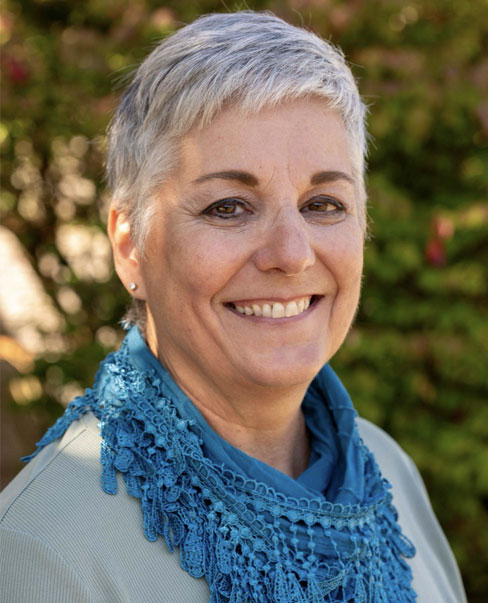 Casey began working at the Edmonds Food Bank in 2018. She uses her background in business
and degrees from the College of William and Mary (BBA) and Johns Hopkins University
(MAS) to support the journey toward food security in Edmonds. In 2022 she earned a
Master’s in Nonprofit Leadership from Seattle University. Married for 27 years, Casey
and her husband Steve have two grown children. She is a member of the Edmonds Lions
Club, Edmonds Chamber of Commerce, and Edmonds Petanque Club.
Casey began working at the Edmonds Food Bank in 2018. She uses her background in business
and degrees from the College of William and Mary (BBA) and Johns Hopkins University
(MAS) to support the journey toward food security in Edmonds. In 2022 she earned a
Master’s in Nonprofit Leadership from Seattle University. Married for 27 years, Casey
and her husband Steve have two grown children. She is a member of the Edmonds Lions
Club, Edmonds Chamber of Commerce, and Edmonds Petanque Club.
Access to nutritious food is a human right and we must look at the intersectionality of food with other layers of injustice that traditionally marginalized and underrepresented groups face. We strongly believe that resilience means relying on community support that we can build for each other. We were not meant to do it all alone, especially when the system is working against many of us.
Cathy Assata and Arra Rael
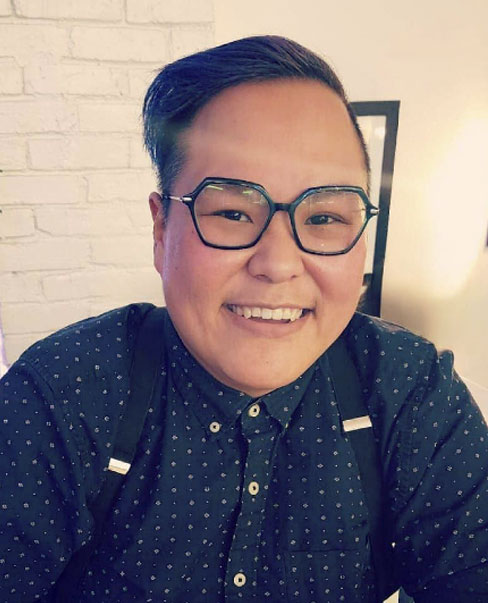 Arra Rael is currently the Diversity, Equity, Inclusion, and Belonging Director for
Center for Human Services, a Washington based behavioral health and family support
non-profit. She has a passion for community work, and a DEIB approach that incorporates
the concepts of anti-racism, cultural humility, and decolonizing behavioral health.
Arra Rael is currently the Diversity, Equity, Inclusion, and Belonging Director for
Center for Human Services, a Washington based behavioral health and family support
non-profit. She has a passion for community work, and a DEIB approach that incorporates
the concepts of anti-racism, cultural humility, and decolonizing behavioral health.
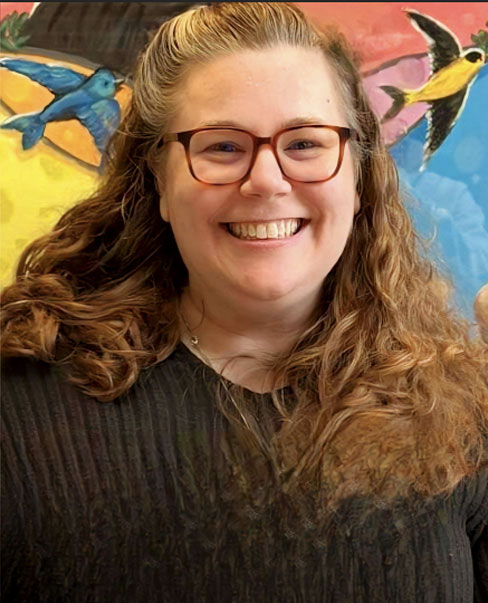 Cathy Assata (she/her) is currently the Substance Use Disorder Department Director
at the Center for Human Services. She has a BS in Healthcare Management, is a Substance
Use Disorder Professional, and a certified trainer in several evidenced-based practices.
Cathy has worked in the substance abuse treatment field since 1999, in correction-based
treatment in both Wisconsin and Washington states in addition to both residential
and outpatient non-profit settings. She is a member of the American Counseling Association
(ACA) and the Society for Sexual, Affectional, Intersex, and Gender Expansive Identities
(SAIGE).
Cathy Assata (she/her) is currently the Substance Use Disorder Department Director
at the Center for Human Services. She has a BS in Healthcare Management, is a Substance
Use Disorder Professional, and a certified trainer in several evidenced-based practices.
Cathy has worked in the substance abuse treatment field since 1999, in correction-based
treatment in both Wisconsin and Washington states in addition to both residential
and outpatient non-profit settings. She is a member of the American Counseling Association
(ACA) and the Society for Sexual, Affectional, Intersex, and Gender Expansive Identities
(SAIGE).
Intersecting Identities and Resilience
Trauma changes the brain, and collective, historical trauma, that comes from intersecting identities can be excessively harmful and lead to self-defeating behaviors that then continue to perpetuate the trauma cycle. When a community comes together to help stop these cycles from repeating, by providing support, compassion, belonging, basic needs, and safety for traditionally underrepresented and marginalized groups of people then we see a wave of resiliency and hope.
We will show that there are factors outside of our control that exacerbate trauma based on our identities, things that we have little control over, and then find the connection within ourselves and our communities that we do have control over, such as our actions and reactions, that can build a sense of resiliency and help boost the signal to reach more people. By introducing PACEs (Protective and Compensatory Experiences) we will discuss ways we, as a community, can support those with intersecting marginalized identities, build resiliency, and learn how to navigate inequitable systems.
David Voetmann
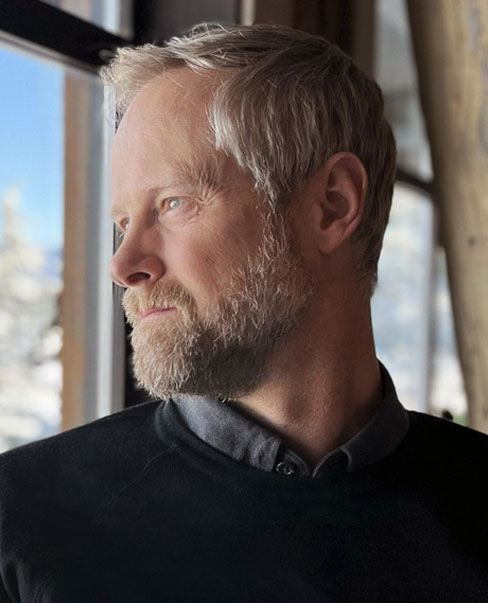 Growing up deep in the bush country of Africa ignited a creative instinct in David.
He followed that creative drive, earning a BFA in Industrial Design at the University
of Washington and, for the last decade, has explored the transformation of our economy
as new technologies democratize product development and small scale manufacturing.
He is now the Director of the Center for Innovation and Entrepreneurship at Edmonds
College where ordinary people with extraordinary ideas gain access to an 11,000sf
sandbox with the tools, training, and community to turn thoughts into things.
Growing up deep in the bush country of Africa ignited a creative instinct in David.
He followed that creative drive, earning a BFA in Industrial Design at the University
of Washington and, for the last decade, has explored the transformation of our economy
as new technologies democratize product development and small scale manufacturing.
He is now the Director of the Center for Innovation and Entrepreneurship at Edmonds
College where ordinary people with extraordinary ideas gain access to an 11,000sf
sandbox with the tools, training, and community to turn thoughts into things.
David believes we are at a pivotal moment in history and we won’t get out of this mess by doubling down on the thinking that got us here. Without fresh perspectives from diverse minds, status quo thinking threatens to tip the scale toward darkness. We need all hands on deck. Unfortunately, our future is being created by fewer and fewer individuals. Bringing more vision to the table requires rekindling our creative instinct. The process of turning ideas into reality is way more satisfying than buying someone else’s imagination off a shelf. Can we also abandon our debilitating fear of failure? Failure is a broken mental model based on an assumption that it's possible to know before we act. This tragic illusion limits our potential as a species and makes it all but impossible to exceed our existing threshold of knowledge. What if we could reimagine failure as feedback? What if we made feedback loops tighter and cheaper? Each of us has a chance, daily, to take that first small step, even if it’s muddy or more of a stumble than a step. A thriving future awaits us if we are courageous enough to move forward.
So, get out there and find your people. By trying things, crazy things, together we will learn and grow. The future is waiting.
Dr. Nekya Jenise Young
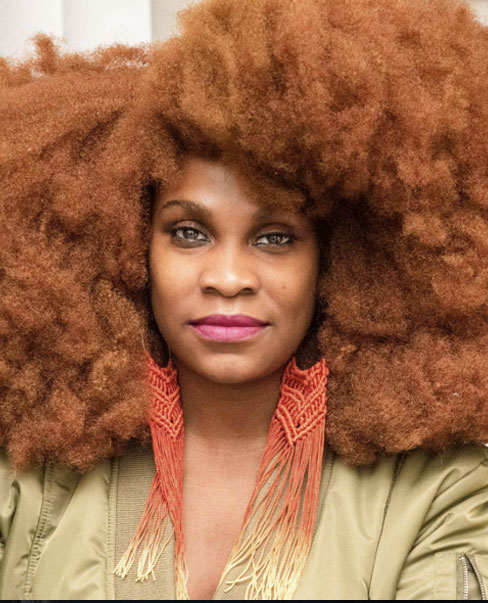 Dr. Nekya Jenise Young grew up as 1 of 4 children in Grand Rapids, Michigan. She credits
her parents for encouraging their children to incorporate cultural competence with
learning. That said, Nekya chose to attend Historically Black Colleges and Universities,
America’s beloved cultural institutions, after high school. She has Sociology B.S.,
and Strategic Leadership, M.S. degrees from Tennessee State University and a Ph.D.
in Urban Planning and Environmental Policy (minor in Urban Higher Education) from
Texas Southern University. Her work has been published in Forbes; peer-reviewed Journal
of STEM Education; ProQuest and featured in the Emmy-award winning James Cameron series,
The Years of Living Dangerous. She is the author of “Identifying the Geography of
Opportunities for Historically Black Colleges and Universities.
Dr. Nekya Jenise Young grew up as 1 of 4 children in Grand Rapids, Michigan. She credits
her parents for encouraging their children to incorporate cultural competence with
learning. That said, Nekya chose to attend Historically Black Colleges and Universities,
America’s beloved cultural institutions, after high school. She has Sociology B.S.,
and Strategic Leadership, M.S. degrees from Tennessee State University and a Ph.D.
in Urban Planning and Environmental Policy (minor in Urban Higher Education) from
Texas Southern University. Her work has been published in Forbes; peer-reviewed Journal
of STEM Education; ProQuest and featured in the Emmy-award winning James Cameron series,
The Years of Living Dangerous. She is the author of “Identifying the Geography of
Opportunities for Historically Black Colleges and Universities.
By day, Nekya works as a Civil Rights and Environmental Justice Manager and by night she is founder of Communitelling, a community storytelling consulting agency. Outside of school and work she enjoys spending time with her “son”shine and other family. My 12-minute story will inspire others to think about the resilience of historically Black Colleges and Universities (HBCUs) in a new way. It wasn’t until the late 1990s that HBCUs used policy, community, advocacy, and unity to undo the devastating impacts of urban renewal in HBCU neighborhoods. I am confident the audience will be inspired by the resilient accomplishments of HBCUs and how they worked to transform their neighborhoods.
Emmanuel Williams
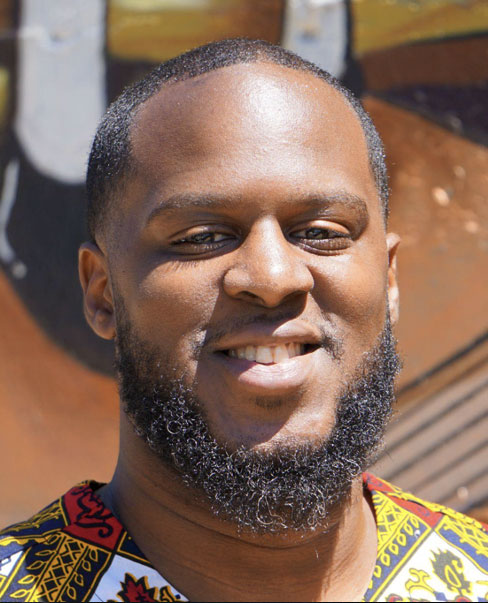 Emmanuel Williams is the Director of Community Justice & Equity for the Black United
Fund of Oregon, based in Portland, Oregon. Also, he is the visionary Founder and Principal
Trainer of YPD Equity Consulting, a leading organization dedicated to conflict management
coaching through a racial equity lens.
Emmanuel Williams is the Director of Community Justice & Equity for the Black United
Fund of Oregon, based in Portland, Oregon. Also, he is the visionary Founder and Principal
Trainer of YPD Equity Consulting, a leading organization dedicated to conflict management
coaching through a racial equity lens.
Nonprofit work aimed at dismantling inequities is inherently challenging. At the heart of overcoming these challenges is a potent self-affirmation: 'It can be done.' This message transcends speech, influencing the boundless potential of our actions and reshaping narratives. It energizes the 50 trillion cells in our bodies towards our objectives. My talk interlaces the resilient tales of my grandfather, a Deep South sharecropper; my father, a lawyer-turned-pastor; and myself, who left corporate America for nonprofit work that engages and empowers the historically harmed communities. These stories demonstrate that resilience, not adversity, defines us. By sharing these tales of perseverance across generations, I seek to dissolve apathy, spark hope, and inspire action within communities facing marginalization.
Erica Walters
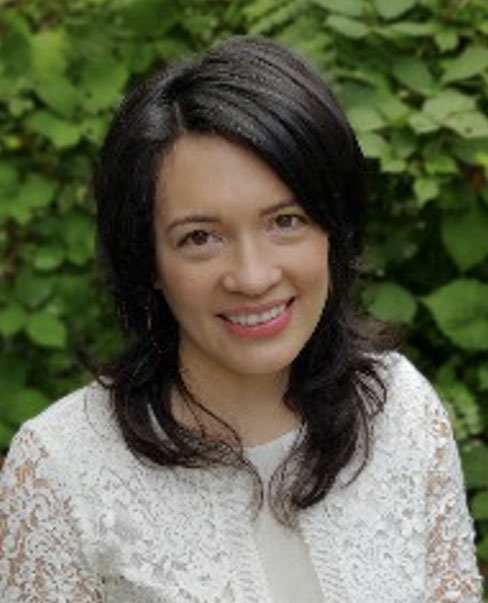 Erica is a National Certified Counselor and a Licensed Mental Health Counseling Associate.
She earned her Master of Arts degree from Antioch University Seattle, a CACREP-accredited
institution. Erica currently lives in Washington State where she works as a full time
Mental Health Counselor at Edmonds College. In addition to serving a diverse student
population, Erica’s counseling work includes facilitating workshops and presentations
on the college campus to create outreach opportunities, and increase student body
access to resources. Erica is also a researcher and one of the primary members of
the International Resilience Research Team for the last three years.
Erica is a National Certified Counselor and a Licensed Mental Health Counseling Associate.
She earned her Master of Arts degree from Antioch University Seattle, a CACREP-accredited
institution. Erica currently lives in Washington State where she works as a full time
Mental Health Counselor at Edmonds College. In addition to serving a diverse student
population, Erica’s counseling work includes facilitating workshops and presentations
on the college campus to create outreach opportunities, and increase student body
access to resources. Erica is also a researcher and one of the primary members of
the International Resilience Research Team for the last three years.
The Western interpretation of resilience is understood as an ability to recover when enduring hardship by using self-efficacy and optimism. Globally there is evidence of protective factors that are indicative of resilience. Therefore, we limit our understanding of resilience by prioritizing Western values and implementing a singular set of standards across cultures. So what is a multicultural application of resilience?
If we are to expand beyond the Western notions that drive our view of resilience and begin incorporating collectivistic perspectives, maybe it begins with the idea that resilience is not singular. By embracing the concept of collectivism, we expand the concept of resilience, which I will discuss further by using a concept called the 4 C’s. Consider then, a new image for resilience: a dynamic interaction of the individual that interweaves connection, culture, community, and capacity as essential components.
J-Anne Carlson
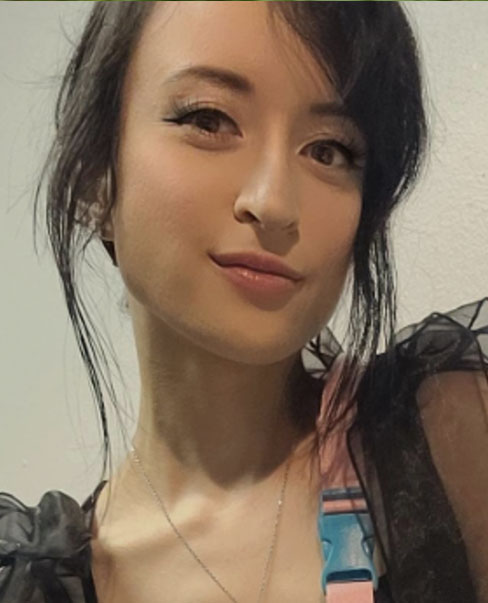 J-Anne is a mental health specialist and nurses assistant in intensive care who is
transitioning into engineering. Her passion lies in creating efficient healthcare
and aerospace systems and plans to major in systems engineering. At Edmonds College
she is the vice president of Edmonds College Rocketry and she is studying Mechatronics,
Robotics and Ai. Beyond her dedication to academics, she is a visual artist and storyteller
who has been featured in Zee Zee Theater for Virtual Humanity (Human Library) with
her story "Man of the House as told by a Woman". Her artistry combines both digital
and physical elements in mixed and multimedia artistry.
J-Anne is a mental health specialist and nurses assistant in intensive care who is
transitioning into engineering. Her passion lies in creating efficient healthcare
and aerospace systems and plans to major in systems engineering. At Edmonds College
she is the vice president of Edmonds College Rocketry and she is studying Mechatronics,
Robotics and Ai. Beyond her dedication to academics, she is a visual artist and storyteller
who has been featured in Zee Zee Theater for Virtual Humanity (Human Library) with
her story "Man of the House as told by a Woman". Her artistry combines both digital
and physical elements in mixed and multimedia artistry.
Josh Epstein
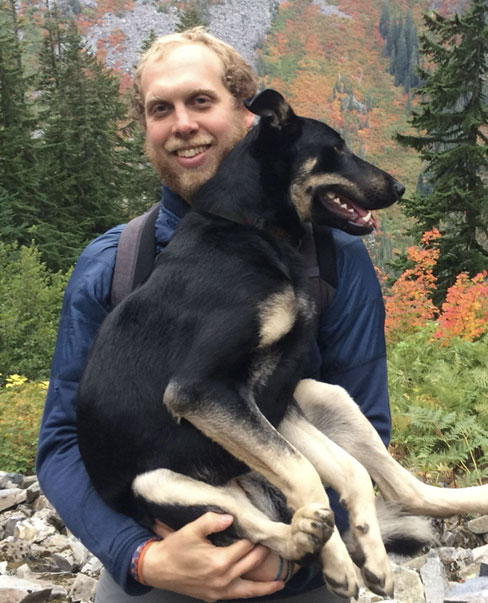 Josh Epstein is the director of Seattle REconomy, a nonprofit creating an economy
of reuse, and manager at their Shoreline and NE Seattle tool libraries where they
lend free tools like a book library lends free books. He loves playing guitar and
banjo, eating curry and cookies, and walking up steep mountains. He cares for 5 chickens,
a dog named Eleanor, and a 4 year old named Cedar
Josh Epstein is the director of Seattle REconomy, a nonprofit creating an economy
of reuse, and manager at their Shoreline and NE Seattle tool libraries where they
lend free tools like a book library lends free books. He loves playing guitar and
banjo, eating curry and cookies, and walking up steep mountains. He cares for 5 chickens,
a dog named Eleanor, and a 4 year old named Cedar
In truly resilient communities, there are no marginalized groups of people, and everyone has the tools they need to take care of themselves. This is why we created the nonprofit Seattle REconomy and grew two community tool lending libraries, to strengthen our community by sharing abundance. We offer over 10,000 tools which are often otherwise inaccessible to underserved communities, either because of price, space, or in some cases such as gender, cultural norms.
Mira Kraft
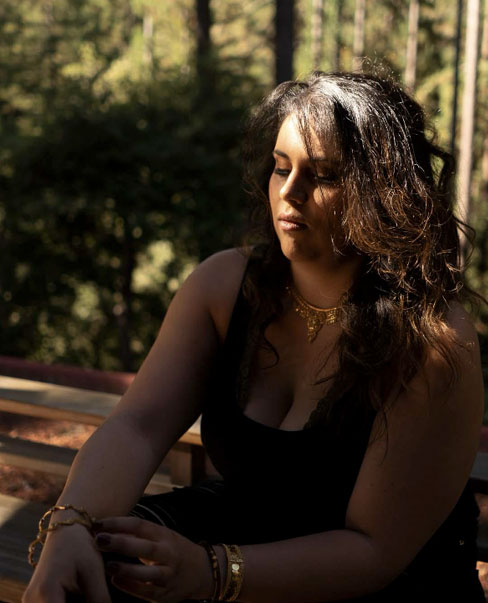 Embarking on a journey of creativity and innovation, Mira Kraft is the visionary force
behind MKPR—a dynamic events and creative direction company established in 2017. With
a multifaceted background spanning marketing, artist management, and event production,
Mira has etched her mark in the entertainment world. Kraft has also served on the
BASE board with the Cultural Space Agency, Co-founded nonprofit CNTR, is a member
of the Recording Academy PNW Chapter, and serves as the Events Programs Director for
Music For Everybody; a nonprofit founded by Marshall Law Band. In her thought-provoking
talk Mira dives into the complex layers of resilience, reframing it not as mere endurance
but as an evolving process of growth, healing, and self-discovery. She explores the
neuroscience of resilience, and challenges societal norms around strength, inviting
us to embrace our most vulnerable moments as catalysts for transformation.
Embarking on a journey of creativity and innovation, Mira Kraft is the visionary force
behind MKPR—a dynamic events and creative direction company established in 2017. With
a multifaceted background spanning marketing, artist management, and event production,
Mira has etched her mark in the entertainment world. Kraft has also served on the
BASE board with the Cultural Space Agency, Co-founded nonprofit CNTR, is a member
of the Recording Academy PNW Chapter, and serves as the Events Programs Director for
Music For Everybody; a nonprofit founded by Marshall Law Band. In her thought-provoking
talk Mira dives into the complex layers of resilience, reframing it not as mere endurance
but as an evolving process of growth, healing, and self-discovery. She explores the
neuroscience of resilience, and challenges societal norms around strength, inviting
us to embrace our most vulnerable moments as catalysts for transformation.
Sarah Koski
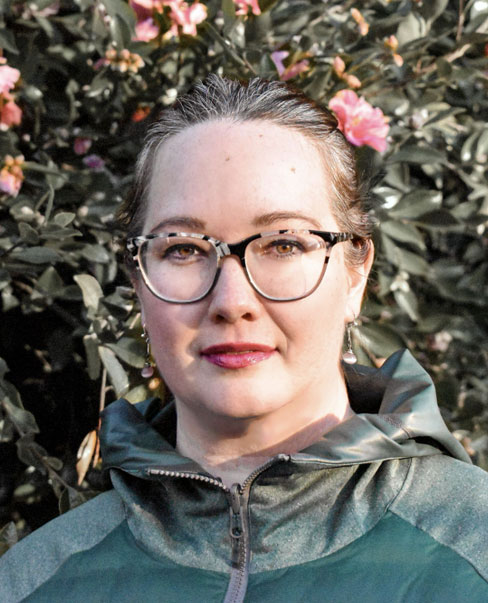 Sarah A. Koski is a homeless advocate and Community Resource Liaison for Lane Transit
District, residing in Eugene, Oregon. In 2019, Sarah left her position as Executive
Director of a regional nonprofit to work in the trenches of homelessness as a case
manager and crisis interventionist for one of Oregon’s largest lowest barrier shelters.
Now, Sarah is building new programs, resource guides, and inroads at Lane Transit
District, navigating the intersection of transit, infrastructure, and those experiencing
homelessness.
Sarah A. Koski is a homeless advocate and Community Resource Liaison for Lane Transit
District, residing in Eugene, Oregon. In 2019, Sarah left her position as Executive
Director of a regional nonprofit to work in the trenches of homelessness as a case
manager and crisis interventionist for one of Oregon’s largest lowest barrier shelters.
Now, Sarah is building new programs, resource guides, and inroads at Lane Transit
District, navigating the intersection of transit, infrastructure, and those experiencing
homelessness.
Sarah received her bachelor’s in political science from the Robert D. Clark Honors College at the University of Oregon and found her passion for humanitarian activism through her work with the American Red Cross. Her leadership as chair of the Lane County COAD during one of Oregon’s most devastating wildfires displayed her dedication to disaster relief and community support.
In 2021, she ran one of the first community-led disaster activations solely for the unhoused during a local triple-digit heat wave. Her experience as a disaster relief strategist paved the way for her to be appointed to two separate gubernatorial task forces on economic and social reform.
Sarah’s notable work on non-profit philanthropy has been highlighted by the UN University
of Peace. She is currently a member of her local Human Rights Commission Poverty and
Homeless Task Force and a proud member of her local church, PHD Ministries. Recently,
her work supporting vulnerable voices garnered her a Vital Voices & Esteé Lauder Top
100 Global Women recognition and the 2024 Oregon Women’s Commission Woman of the Year
award as an “emerging leader”. Her goal is to develop new means of storytelling and
redirect narratives to advocate for vulnerable populations, while also fostering innovation
through an equitable lens.
Xenia Dolovova
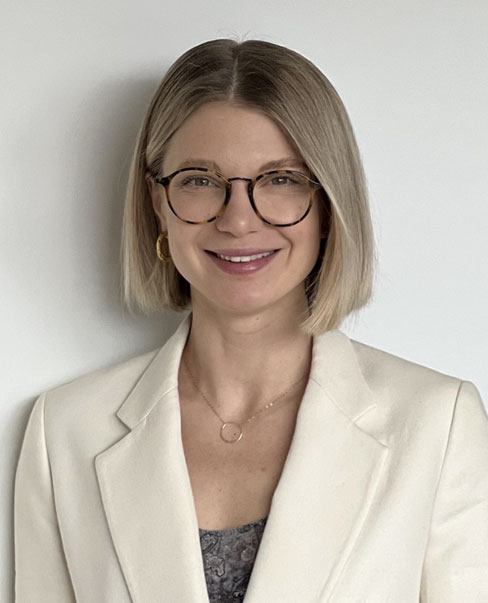 Xenia Dolovova, Founder and Director of the Furniture Repair Bank, is a visionary
leader dedicated to tackling furniture waste and promoting equitable access. After
a decade in business and marketing across Europe and the Middle East, she pivoted
her career in 2019 to address waste issues at Zero Waste Washington, where Xenia's
commitment to sustainability shone through as she spearheaded research, community,
and innovation initiatives before founding the first-in-the-nation Furniture Repair
Bank, fostering a community of mighty, courageous, and empathic individuals.
Xenia Dolovova, Founder and Director of the Furniture Repair Bank, is a visionary
leader dedicated to tackling furniture waste and promoting equitable access. After
a decade in business and marketing across Europe and the Middle East, she pivoted
her career in 2019 to address waste issues at Zero Waste Washington, where Xenia's
commitment to sustainability shone through as she spearheaded research, community,
and innovation initiatives before founding the first-in-the-nation Furniture Repair
Bank, fostering a community of mighty, courageous, and empathic individuals.
Our story with Furniture Repair Bank illustrates a transformative journey of empowerment and resilience, particularly for traditionally marginalized groups. Our work challenges the prevailing narrative that damaged or imperfect items are disposable and irreparable. Instead, we demonstrate that with a community-driven approach and the right resources, we can not only salvage these items but also empower individuals and communities along the way. As the first initiative of its kind in the US, Furniture Repair Bank addresses multiple layers of societal challenges.

